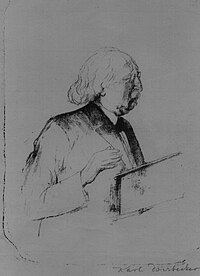赫爾曼·科恩(德語:Hermann Cohen,1842年7月4日—1918年4月4日),德國猶太哲學家,新康德主義馬堡學派的創始人之一,通常被稱為「十九世紀最重要的猶太哲學家」。
此條目需要補充更多來源。 (2017年11月7日) |

生平
科恩出生於安哈爾特的科斯維希。他早年開始學習哲學,很快就以對康德的深刻理解而小有名氣。科恩曾就讀於德紹的大學預科、布雷斯勞猶太神學院、布雷斯勞大學、柏林大學和哈勒大學。 1873年,科恩成為馬堡大學哲學系的無薪講師,論文題目是《康德前批判文章中的系統觀念與批判觀念論的關係》( Die systematischen Begriffe in Kant's vorkritischen Schriften nach ihrem Verhältniss zum kritischen Idealismus)。 1875年科恩被選為馬堡大學副教授,次年升為正教授(參見「德國學術系統」)。
1902年11月在柏林首次舉行的「猶太教科學促進會」,科恩是創始人之一。
科恩編輯出版了弗里德里希·艾爾伯特·蘭格(Friedrich Albert Lange)的最後哲學著作《邏輯學研究》(萊比錫,1877)。此外,科恩還編輯了蘭格的《唯物主義史與對其當前重要性的批判》,並寫了幾個版本的長篇引言和批判性補充。
科恩致力於解釋康德的經驗理論、倫理學基礎和美學基礎,並於1902年開始出版他自己的三卷系統哲學的重要著作:《邏輯學與純粹認識》(1902) 、《倫理學與純粹意志》(1904)、《美學與純粹感受》(1912)。計劃關於心理學的第四卷一直沒有寫成。
科恩還寫了一些關於猶太教的著作,包括一系列小冊子,如《安息日的文化歷史意義》(1881)、《關於猶太問題的坦白》(柏林,1880),以及文章「猶太人倫理問題」(《月刊》,xliii,1899,pp. 385-400,433-449)、 「上帝和人類觀念中的愛與正義」(《猶太歷史與文學年鑑》,III,1900,pp. 75–132)、「自律與自由」(《大衛·考夫曼紀念手冊》,1900)。
科恩最知名的猶太著作有:《起源於猶太教的理性宗教》(1919)[1]、《德國文化與猶太文化》、《塔木德中的博愛》以及《邁蒙尼德的倫理學思想》。《塔木德中的博愛》一文是根據馬堡皇家地方法院(3d ed., Marburg, 1888)的要求寫成的。科恩有關猶太思想的著作收錄在他的《猶太文集》(三卷本,布魯諾·施特勞斯,柏林,1924)中。 目前,科恩的學術著作正在進行新版匯編,由Helmut Holzhey,Hartwig Wiedebach等人負責編輯(Olms, Hildesheim 1977 ff.)。在這些猶太著作中,《理性與希望:赫爾曼·科恩猶太作品選集》已經被翻譯成英文( Eva Jospe, NY 1971)。
對於猶太復國主義及其建立猶太國家、「讓猶太人回到歷史」的宏大抱負,科恩曾直言不諱的反對。科恩認為,猶太教內在地具有一種歷史性,其精神和道德使命遠遠超越了猶太復國主義的民族主義目標。
儘管科恩對猶太復國主義抱有反對態度,特拉維夫還有一條「赫爾曼·科恩街」。
科恩去世後葬於柏林的Weißensee公墓。
著述
- English translations are indented.
- "Die Platonische Ideenlehre Psychologisch Entwickelt," in "Zeitschrift für Völkerpsychologie," 1866, iv. 9 ("Platonic Ideal Theorie Psychologically Developed")
- "Mythologische Vorstellungen von Gott und Seele," ib. 1869 ("Mythological Concepts of God and the Soul")
- "Die dichterische Phantasie und der Mechanismus des Bewusstseins," ib. 1869 ("Poetic Fantasy and Mechanisms of Consciousness")
- Jüdische Schriften. Introduction by Franz Rosenzweig, edited by Bruno Strauss. Berlin, C. A. Schwetschke: 1924.
- Excerpts have been published in English translation: Reason and Hope: Selections from the Jewish Writings of Hermann Cohen. Translated by Eva Jospe. Cincinnati: Hebrew Union College Press, 1993. (Originally published New York: Norton, 1971, in series: B'nai B'rith Jewish Heritage Classics, with additional material.)
- "Zur Kontroverse zwischen Trendelenburg und Kuno Fischer," ib. 1871 ("On the controversy between Trendelenburg and Kuno Fischer")
- Kant's Theorie der Erfahrung, Berlin, 1871; 2d ed., 1885 ("Kant's Theory of Experience").
- [One central chapter of the 1885 edition is translated as 2015, "The Synthetic Principles," D. Hyder (trans.), in S. Luft (ed.), The Neo-Kantian Reader, Oxford: Routledge.]
- Kant's Begründung der Ethik, Berlin, 1877 ("Kant's Foundations of Ethics")
- "Platon's Ideenlehre und die Mathematik," Marburg, 1878 ("Mathematics and Theory of Platonic Ideals")
- Das Prinzip der Infinitesimalmethode und seine Geschichte: ein Kapitel zur Grundlegung der Erkenntnisskritik, Berlin, 1883 ("The Principle of the Method of Infintesmals and its History: A Chapter Contributed to Critical Perception")
- A short selection is translated as 2015, "Introduction," D. Hyder and L. Patton (trans.), in S. Luft (ed.), The Neo-Kantian Reader, Oxford: Routledge.
- Religion der Vernunft aus den Quellen des Judentums. (1919, repr. Fourier: 1995)
- Religion of Reason out of the Sources of Judaism. Translated, with an introduction, by Simon Kaplan. Introductory essay by Leo Strauss. New York: F. Ungar, 1972.
- "Spinoza über Staat und Religion, Judentum und Christentum" (1915).
- Spinoza on State and Religion, Judaism and Christianity. Translated and with an introduction by Robert S. Schine. Jerusalem: Shalem Press, 2014.
- "Von Kant's Einfluss auf die Deutsche Kultur," Berlin, 1883 ("On Kant's Influence on German Culture")
- Kant's Begründung der Aesthetik, Berlin, 1889 ("Kant's Foundations of Aesthetics")
- "Zur Orientierung in den Losen Blättern aus Kant's Nachlass," in "Philosophische Monatshefte," 1890, xx. ("An Orientation to the Loose Pages from Kant's Literary Estate")
- "Leopold Schmidt," in "Neue Jahrbücher für Philologie und Pädagogik," 1896, cliv.
參考文獻
擴展閱讀
外部連結
Wikiwand in your browser!
Seamless Wikipedia browsing. On steroids.
Every time you click a link to Wikipedia, Wiktionary or Wikiquote in your browser's search results, it will show the modern Wikiwand interface.
Wikiwand extension is a five stars, simple, with minimum permission required to keep your browsing private, safe and transparent.

